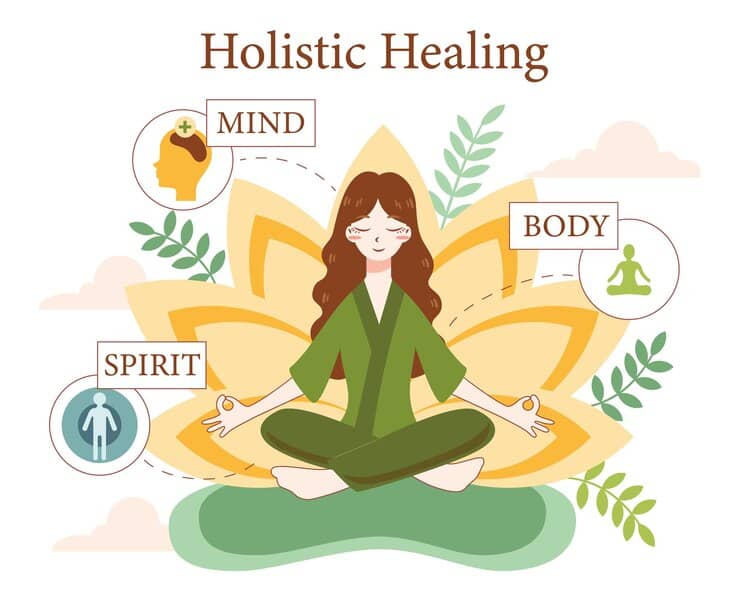Ancient Holistic Health – healing of the body and mind, along with associated products, remains extremely popular and is likely to continue worldwide. However, it is important to note that such therapies are not new; rather, they have been practiced for centuries. Most natural healing methods commonly used today trace their origins to cultures deeply focused on achieving balance in every aspect of life—physical, mental, and spiritual. This article explores the genesis of ancient holistic health, particularly in relation to Traditional Chinese Medicine (TCM) and Ayurveda, both of which continue to complement modern wellness practices.
What are the historical roots of holistic health care?
The historical roots of ancient holistic health stem from time-honored systems such as Traditional Chinese Medicine (TCM) and Ayurveda. These practices emphasize harmony between the body, mind, and spirit, utilizing natural healing therapies like herbal treatments and meditation.
The concept of well-being, practiced through ancient holistic health principles, dates back thousands of years. Early medicine practitioners understood that focusing solely on physical symptoms was insufficient for achieving lasting wellness. Traditional Chinese Medicine, Ayurveda, and even ancient Greek healing emphasized treating the whole person rather than isolated ailments.
By incorporating therapies like acupuncture, herbal medicine, and spiritual practices, ancient holistic health continues to influence modern complementary and alternative medicine. Today, increasing research supports these holistic approaches, integrating them into contemporary healthcare models worldwide.
Acupuncture, the usage of herbal medications, and religious practices for the unification of mind-body as conducted in these ancient systems are not far too different. These days, more research is backing this trend, where these techniques are incorporated into complementary and alternative medicine.
How does Traditional Chinese Medicine influence natural healing therapies today?
Traditional Chinese Medicine (TCM) continues to influence modern natural healing therapies with practices like acupuncture, herbal medicine, and Qi Gong, which promote energy flow and balance within the body.
TCM is regarded as one of the most fundamental medical strategies in integrated health care. It began with ideas like Yin, Yang, and Qi, five spheres that are still in practice in most integrative health today. TCM practices, including acupuncture and the use of herbal medications for health conditions such as chronic pain, stress, and many others, are commonplace all over the world. These practices help the individuals undergo healing and wellness where, on all the approaches, preventative and curative methods are considered.
What role does Ayurveda play in holistic health care?

Ayurveda, one of the world’s oldest natural healing therapies, is integral to modern holistic health care, focusing on balancing bodily energies called doshas through diet, meditation, and herbal treatments.
It is a practice that started thousands of years ago in India and offers an incorporation on non-conventional healing practices. The emphasis is on achieving equilibrium of the three doshas, which are related to the body and mind. Treatment based on usage of Ayurveda encourages several practices including but not limited to herbal medicine for overall health, diet, yoga, and mediation to bring balance back. Most practitioners of medicine based on the principles of complementary health care use Ayurveda not only for management but also for chronic care prevention especially in the digestive and stress-related areas.
What are some ancient holistic therapy benefits still used today?
Ancient holistic therapy benefits such as stress reduction, improved energy flow, and enhanced immunity are still relevant today, primarily through practices like acupuncture, meditation, and herbal remedies.
The methods of healing the body in ancient times in the forms of practices like acupuncture, yoga, and herbal medicine are still relevant with their positives. These natural health remediations were created for people with holistic health concepts rather than just focusing on physical issues but instead on the whole person’s mind and body.
Indeed, a modern-day practitioner of holistic health still employs these old techniques with additional benefits such as lower stress levels, sleep, and increased mental clarity. All these, in light of present-day pain management practices, are such that a person is relieved of all the related aspects of pain rather than just the physical part of the aggravation.
How did complementary medicine evolve from ancient healing practices?
Complementary medicine evolved by integrating ancient healing practices such as Ayurveda and TCM with modern healthcare, offering a more holistic approach to wellness.
The introduction of complementary and alternative medicine (CAM) was historically due to the growing appreciation by the modern medicine system of the shortcomings of conventional treatment. Complementary and alternative medicine CAM integrates ancient practices of mind body wellness and total health care into modern medicine.
This integrative health practice presents the middle ground treatment whereby treatment modalities such as acupuncture and meditation are used in conjunction with western medical procedures. Such an advancement makes it possible for patients to reap discoveries from both conventional medicine and alternative medicine.
What ancient herbal medicine for holistic care is still relevant today?
Ancient herbal medicine for holistic care, such as Ashwagandha, Ginseng, and Turmeric, remains widely used for stress relief, immunity support, and inflammation control.
For thousands of years, healers and caregivers utilized herbs for the sake of wellness. These plants were the only available medicines that offered something for almost any health problem. For instance, Ashwagandha is famous for its stress-lowering effects, while Ginseng is considered to enhance energy and concentration.
Turmeric is also spread across Ayurvedic and TCM systems, where it acts as an effective anti-inflammatory ingredient. This evolution of herbal medicines as stress and chronic pain management solutions shows how ancient traditions have found a place in contemporary clinical practices.
How is mindfulness and holistic health connected in ancient practices?

Mindfulness and holistic health were deeply connected in ancient healing practices like yoga and meditation, promoting mental clarity, emotional balance, and physical health.
Mindfulness, practiced in Buddhism and Hinduism, forms an integral part of health care. Mental health, as this generation appreciates today, is understood by ancient practitioners to coexist with physical health hence the need for drugs such as yoga and meditation during healing processes.
These are now pivotal in energy healing therapy and integrative wellness treatment – where emotional stress, attention, and the capacity to withstand negative emotions are encouraged. This focus on overall wellness of the body and mind means that the treatment is all effective with the use of complementary therapies.
Conclusion: Ancient Wisdom Meets Modern Wellness
Even before the advent of the 20th century and the coinage of the term ‘holistic’ the term has hidden the ever-invisible systems of health care throughout the world. Long before alternative medicine became fashionable and commercially viable, the ancient systems of Ayurveda and traditional Chinese medicine were already constructing the building blocks of what is known today as integrated medicine. Through natural therapy approaches, we can address our health in a more complete and rational healthcare approach.
Most practitioners of natural health remedies hold that the body can heal itself unless some treatments and procedures are more than just a few and can do a very complementary approach. For most of them, when searching for “holistic therapy near me” or simply looking for some alternative treatments, the ancient levelheaded perception, and practice are disturbed even in the period when science seems to have taken over medicine.


